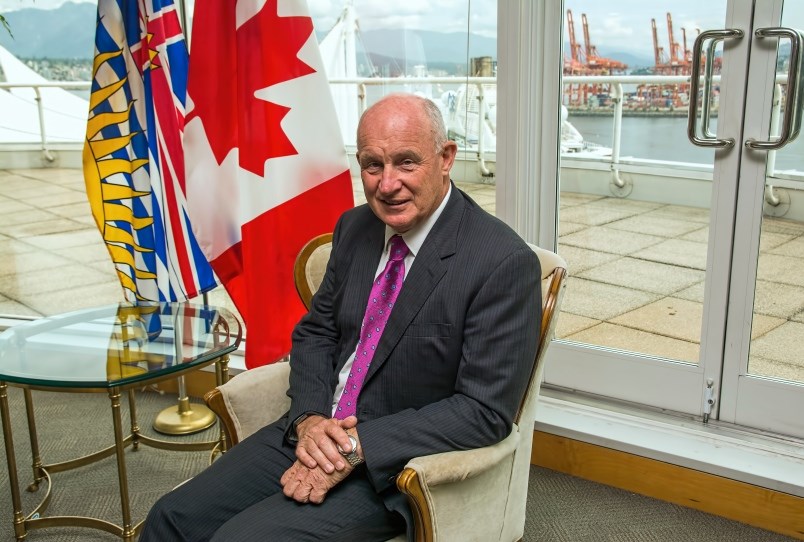Minister of Public Safety and Solicitor General Mike Farnworth says when the legislature resumes sitting next week he’ll set up an all-party committee to “engage with communities and experts on how the 45-year-old [Police Act] can be modernized.”
In a statement issued June 12, Farnworth said he met with Premier John Horgan on the issue and the committee’s work will “reflect today's challenges and opportunities for delivering police services with a specific focus on systemic racism.”
“Everyone deserves to be treated fairly by the police, and our government acknowledges that for many Black, Indigenous and other people of colour, that hasn’t always been the case,” Farnworth said. “Ensuring the police are held accountable to the highest standards for fair and unbiased conduct is crucial to maintaining public trust.”
Speaking on Eastlink Community TV’s Parliamentary Talkback the day before Farnworth’s announcement, Powell River-Sunshine Coast MLA Nicholas Simons said the demonstrations across the U.S. and Canada, including one that drew upwards of 1,000 people in Sechelt, reflect a “realization of the importance of accountability from our public institutions, including law enforcement.
“If a community doesn’t feel that there is accountability that’s transparent, there’s mistrust or distrust,” Simons said. “There's a long history of tension, often between different groups of people and different police forces or different authorities, and I think it’s an important dialogue to have.”
West Vancovuer-Sunshine Coast-Sea to Sky Country MP Patrick Weiler was also on the program and said it’s naïve to think there’s no racism in Canada or Canadian institutions.
“And it’s really easy to see that when you look at the numbers and the disproportionate representation of Black people and First Nations people in incarceration rates, and the likelihood to face violence when dealing with police officers,” Weiler said. “I think it goes beyond just our institutions, it also goes towards the more casual types of racism we see in society and the micro-aggressions that you see that are quite often.”
On the calls to defund police, Weiler said, “I don’t think that they are saying that in the sense that we need to fully cut the capacity of the police. They’re not saying that police don’t do an absolutely critical service. I think a lot of people, when they refer to it in that sense, they’re talking about some of the ancillary roles that police have been serving in society that in a lot of cases they’re not always best placed to do.”
Simons said, “Police are the first to tell you that they’re not mental health professionals. And I’ve had many experiences where they were not in the business of, or interested in, adjudicating whether or not a child was safe. Police definitely need to be an important part of this discussion, but it should rightfully include all the social service providers that are also publicly funded.”
Simons said that while he thinks “there was a period of time where we didn’t see the kind of progress that we needed,” there has been progress, including moves by the provincial government to give more resources to the Independent Investigation Office (IIO) and new standards on so-called street checks.
But Simons also said the case of Myles Gray, the Sunshine Coast man who died at the hands of Vancouver Police in August 2015, points to broader issues within the justice system.
Gray’s death was investigated by the IIO, but it took until 2019 for the agency to complete the investigation and forward a report to Crown counsel recommending charges against VPD officers. The BC Prosecution Service is yet to decide if any criminal charges will go ahead.
“When we talk about the justice system, it’s really about where its priorities are. It’s a complicated issue, obviously, but I think the public is prepared to have a discussion about it,” Simons said.
“Oftentimes the public is excluded from the discussion around policing, because we are civilians and we don’t exactly know some of the challenges… We have to respect that, but the discussion is well worth having.”
Local governments on the Sunshine Coast have not waded into the debate in any significant way at this point.
Sechelt councillors, who met for an update on the Sunshine Coast RCMP detachment’s strategic plan on June 10, three days after the demonstration and march in Sechelt, asked about the de-escalation training local RCMP officers are receiving.
At the Sunshine Coast Regional District, directors voted June 11 to discuss the issues around calls to defund police at a future meeting of the policing and public safety committee.
“It’s a conversation that goes well beyond this table,” shíshálh Nation chief and SCRD director Warren Paull said. “Black Lives Matter, that raised the awareness but [the issue has] always been there… We’re all very fortunate to live in the time and place that we do that we can actually have this debate and discussion.”
- With files from Sophie Woodrooffe.



